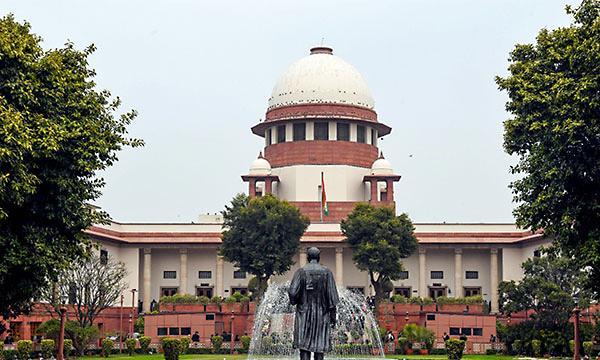SC rejects pleas seeking review of 2023 verdict on gay marriages
The Supreme Court has turned down a batch of petitions seeking to review its October 2023 verdict declining legal sanction to same-sex marriage.
Hearing about 13 petitions related to the matter on Thursday (January 9), a five-judge bench of justices B R Gavai, Surya Kant, B V Nagarathna, P S Narasimha and Dipankar Datta said there was no error in the earlier judgements.
‘No interference is warranted’
“We do not find any error apparent on the face of the record. We further find that the view expressed in both the judgements is in accordance with law and as such, no interference is warranted. Accordingly, the review petitions are dismissed,” the bench said.
It said the judges have carefully gone through the judgements delivered by Justice (since retired) S Ravindra Bhat speaking for himself and for Justice (since retired) Hima Kohli as well as the concurring opinion expressed by Justice Pamidighantam Sri Narasimha, constituting the majority view.
Also read: SC verdict | The arguments made for and against same-sex marriages
Plea for hearing in open court rejected
The bench also rejected a prayer made in the review petitions for hearing in an open court.
According to practice, the review pleas are considered in chambers by the judges.
The new bench was constituted after Justice Sanjiv Khanna, the present Chief Justice of India (CJI), recused from hearing the review petitions on July 10, 2024.
Notably, Justice P S Narasimha is the only member of the original Constitution bench comprising five judges which delivered the verdict, as former CJI D Y Chandrachud and Justices S K Kaul, Ravindra Bhat and Hima Kohli have retired.
What the 2023 judgement said
A five-judge Constitution bench led by then CJI Chandrachud on October 17, 2023, refused to accord legal backing to same-sex marriages and held there was “no unqualified right” to marriage with the exception of those recognised by law.
Also read: Same-sex marriage verdict: Why the system will always be a queer heartbreaker
The apex court, however, made a strong pitch for the rights of LGBTQIA++ persons so that they didn’t face discrimination in accessing goods and services available to others, safe houses known as “garima greh” in all districts for shelter to members of the community facing harassment and violence, and dedicated hotlines in case of trouble.
In its judgement, the bench held transpersons in heterosexual relationships had the freedom and entitlement to marry under the existing statutory provisions.
It said an entitlement to legal recognition of the right to union, akin to marriage or civil union, or conferring legal status to the relationship could be only done through an “enacted law”.
4 verdicts
The five-judge Constitution bench delivered four separate verdicts on a batch of 21 petitions seeking legal sanction for same-sex marriages.
All five judges were unanimous in refusing the legal recognition to same-sex marriage under the Special Marriage Act and observed it was within Parliament’s ambit to change the law for validating such a union.
Also read: How families in Gujarat are justifying conversion therapy after SC verdict on same-sex marriage
While former CJI Chandrachud wrote a separate 247-page verdict, Justice Kaul penned a 17-page judgement where he broadly agreed with the former’s views.
Justice Bhat, who authored an 89-page judgement for himself and Justice Kohli, disagreed with certain conclusions arrived at by the former CJI, including on applicability of adoption rules for such couples.
Justice Narasimha in his 13-page verdict was in complete agreement with the reasoning and conclusion of Justice Bhat.
The judges were unanimous in holding that queerness was a natural phenomenon and not an “urban or elite” notion.
Promise to form a committee
In his judgement, the former CJI recorded Solicitor General Tushar Mehta’s assurance of forming a committee chaired by the cabinet secretary to define and elucidate the scope of entitlements of such couples in a union.
Also read: Nepal becomes first South Asian country to officially register same-sex marriage
The LGBTQIA++ rights activists, who won a major legal battle in 2018 in the Supreme Court, which decriminalised consensual gay sex, moved the apex court seeking validation of same-sex marriages and consequential reliefs such as rights to adoption, enrolment as parents in schools, opening of bank accounts and availing succession and insurance benefits.
Some of the petitioners sought the apex court to use its plenary power besides the “prestige and moral authority” to push the society to acknowledge such a union and ensure LGBTQIA++ persons led a “dignified” life like heterosexuals.
(With inputs from agencies)


Comments are closed.